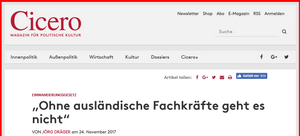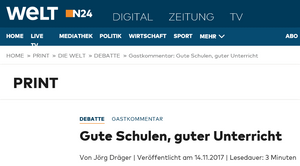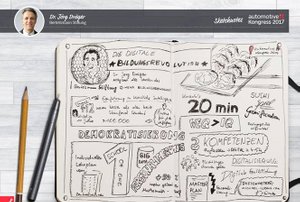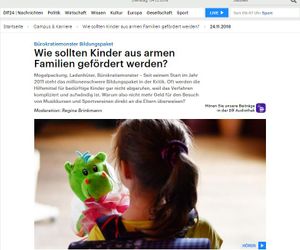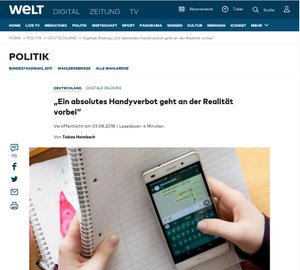EDUCATION • INTEGRATION • DIGITIZATION
Dr. Jörg Dräger
TALKS
Digitale Kompetenz in Schulen
- wie, warum und wer?
(Digital competency in schools - how, why and who?)
Following the slogan „Smart Country“, this year’s Reinhard Mohn Prize addresses the opportunities digitalization offers for Germany. In preparation for the award ceremony on June 29th, we focus on different aspects of digital thinking – compact, brief and specific.
Joerg Draeger answers the question which role digital competencies play in the future.
ASU+GSV Summit: Educating the Algorithm -
how to shape AI's impact on EdTech
EdTech relies on algorithms to personalize content, provide feedback or recommend courses. Each day, automated decisions are made for millions of learners: from exam preparation to career paths, algorithms are shaping not only individual choices but also social equity. To use this potential wisely, we need to make sure their decisions correspond to our values. We know how to educate a child - it's time we learn how to educate an algorithm.
Digitaler Salon: Akademie der Autodidakten
(Digital Salon: Academy of the autodidacts)
Easy recognition of self-taught knowledge and a quicker display of digital skills while job-hunting – this sounds like the future vision of the labor market 4.0. However, in Germany it is still pure utopia. The offer is there, but right now, informal knowledge receives hardly any recognition. Can certificates help to counter the lack of skilled labor? And could refugees and migrants use this to better demonstrate their skills?
Jörg Dräger discusses the opportunities and risks of titles outside the traditional academic institutions for future job markets and integration.
Was Digitalisierung wirklich bedeutet
(What digitization really means)
Beyond superficial changes and adaptations, what does digitization mean for education on a systemic level? What role can and will schools and higher education institutions play, if content is available online? What does affordable access to education mean for our societal structure? How can we teach skills that we don't know yet of?
Jörg Dräger discusses the consequences of digitalizing education and asks critical questions not only for the education system but for society as a whole.
Vocational Education Training in Germany -
advantages and challenges
Germany is known for its multifaceted education system, notably for its vocational training programs. What are the benefits of vocational training? What are the challenges facing the German system? Can the German system be a model for other countries?
In this Q&A with Dr. Jörg Dräger, we hear his opinions on both the advantages and the challenges of today's vocational education training and how digital solutions could help.
Die digitale Bildungsrevolution
(The digital education Revolution)
The future is digital – even in education. Each day, pupils receive a personalized math curriculum that a New York-based computer center develops overnight. A university uses software to predict the best courses for each student, including the prospective grades. A company makes their applicants serve sushi in a virtual restaurant, because the computer game will predict their later success on the job.
Using case studies from all over the world, Joerg Draeger discusses what’s on the horizon with Journalist Jeanne Rubner. He describes schools, universities and start-ups which use new technologies, but also warns against the dangers of an unregulated digitization.
Inklusion im deutschen Schulsystem
(Inclusion in the German education system)
In this interview, Joerg Draeger, member of the Executive Board of Bertelsmann Stiftung, describes the current state of inclusion in the German education System. Based on study conducted by education economist Klaus Klemm on behalf of Bertelsmann Stiftung, he concludes that there's still much work to be done to make German schools more inclusive.
ARTICLES
Wir führen in Deutschland eine falsche KI-Debatte
Der Begriff KI lädt zu Missverständnissen ein. Denn wir tun so, als stünden sich Mensch und Maschine feindlich gegenüber – das ist ein Irrtum.
Handelsblatt, 05.04.2019
"Gerechtere Schulen - für alle"
(Fairer schools - for all)
Der Nationale Bildungsrat könnte bringen, was sich viele Eltern für ihre Kinder wünschen: bundesweit einheitliche Standards für Schulen. Ohne verlässliche wissenschaftliche Erkenntnisse gerät Bildung zum Spielball von Zeitgeist und Ideologie.
Süddeutsche Zeitung, 14.06.2018
"Ohne ausländische Fachkräfte geht es nicht"
(Without skilled workers from abroad, it is not doable)
We have to attract those we need and offer protection for those who need us. Skilled workers are lacking in Germany – especially in TVET fields and the health sector. Stunning 1,1 Mio vacancies cannot be filled. And only a few can be filled today by recent refugees; furthermore, the responsibility of the German state here is humanitarian in nature rather than economic. Currently, most qualified workers migrate to Germany from other European countries, but the continent is aging. Additionally, we attract only very few from outside Europe. Substituting the persisting jungle of regulations, a modern Immigration Act would streamline the application process of new workers. Guiding principles for policy makers should include efficacy, efficiency, transparency and legitimacy in order to make Germany more attractive.
Cicero, 24.11.2017
Gute Schulen, guter Unterricht
(Good Schools, Good Teaching)
Germany’s education system is facing a plethora of challenges: inclusion of special need learners, integration of refugee children, extension of secondary schools by one year, introduction of whole day schooling, and digital learning. And above all, the number of pupils is growing rapidly after a 15 year decline. The financial strains is not the real challenge. More pressingly — more teachers are urgently needed, especially in primary schools. In order to meet the cumulative demand, students ought to be drawn into education, career changers transferred into the system and refugee pedagogues equipped to teach in Germany. Finally, unpopular yet effective measures need to be taken: extending secondary school to nine years should take the backseat, the two-subject-requirement for teachers made optional and class size tolerated to increase.
Welt, 14.11.2017
Die digitale Bildungsrevolution
(The digital education revolution)
"The future is digital – even in education. Each day, pupils receive a personalized math curriculum that a New York-based computer center develops overnight. A university uses software to predict the best courses for each student, including the prospective grades. A company makes their applicants serve sushi in a virtual restaurant, because the computer game will predict their later success on the job. These examples show: The way we learn is changing dramatically, turning our schools, universities and corporate universities upside down. Big Data has a huge impact on the education system as well as the labor market.
Using case studies from all over the world, Joerg Draeger shows what’s on the horizon. He describes schools, universities and start-ups which use new technologies, but also warns against the dangers of an unregulated digitization."
automotiveIT Kongress, 23.03.2017
Was verändern die Flüchtlinge?
(What will refugees change?)
"300 000 refugee children and young people are now entering our schools and kindergartens. Another 100 000 refugees need vocational training, the chance to study and the possibility to enter the job market. Yes, this will cost a whole lot of money. And yes, it will be a huge challenge. The education report published today rightfully stresses this point. But the refugee crisis adds momentum to our schools and universities that has been long overdue: improving the way we deal with diversity, increasing individual support and more flexibility. The result will be beneficial to everyone."
ZEIT, 16.06.2016
Transforming education in the digital age
"Education for all thanks to MOOCs, personalized learning, a college counselor named Big Data and hiring decisions based on computer games instead of degrees – those are only a few of the developments revolutionizing the world around us. (...) If the above is to be successful, Germany’s policymakers must see digitization as a chance to improve the country’s educational system. Digital transformation is not a problem, but part of the solution that can ensure educational excellence and equity."
The European, 25.02.2016
"Das wird ein Angriff auf Eliten"
(This will be an attack on elites)
"That way, an applicant from an emerging market can leave behind a person with a classic western educational background in just 20 minutes. On the one hand, this is global justice, because digitazation provides an easy access to an otherwise closed labor market. On the other hand, it will get people thinking: Why did I work my way through all of our education institutions, if in the end 20 minutes gaming are worth more than my entire life's worth of hard work?"
Welt.de, 27.09.2015
Humboldt gegen Orwell
(Humboldt vs. Orwell)
"Digital Education implies great risks as well: The learner becomes transparent and leaves indelible traces allover the net; his data can be abused. The person, whose educational path is decided on by computer algorithms and who has become an object of probabilities - that sounds more like Orwell's surveillance state than like Humboldt's educational ideal. In order to rule the data instead of being ruled by it, the legal framework for more data souvereignty must be set."
ZEIT, 24.09.2015
INTERVIEWS
Wie sollten Kinder aus armen Familien gefördert werden?
Mogelpackung, Ladenhüter, Bürokratiemonster – Seit seinem Start im Jahr 2011 steht das millionenschwere Bildungspaket in der Kritik. Oft werden die Hilfsmittel für bedürftige Kinder gar nicht abgerufen, weil das Verfahren kompliziert und aufwändig ist. Warum also nicht mehr Geld für den Besuch von Musikkursen und Sportvereinen direkt an die Eltern überweisen?
Deutschlandfunk, 24.11.2018
"Ein absolutes Handyverbot geht an der Realität vorbei"
In Frankreich dürfen Kinder unter 15 Jahren künftig nur noch in speziellen Unterrichtseinheiten ein Mobiltelefon benutzen. Ist das sinnvoll?
Bildungsexperte Jörg Dräger von der Bertelsmann-Stiftung plädiert für weniger strikte Regeln.
Welt, 01.08.2018
Lernen im Netzwerk - die digitalisierte Bildung
(Learning in a network - digitalized education)
"In a classical teaching situation today, the teacher spends 20% of his time with the individual child and 80% standing in front of the class imparting knowledge, while the students ideally remain silent and listen. Remaining silent and listening is something they could do while watching a good learning video. The goal is to turn this 20/80 distribution into a 80/20 one, to enable teachers to take care of the children most of their time, to help them deal with their problems - even if that problem is their parents' divorce. And other media, for example a learning video or software, can explain the Pythagorean theorem to them. A teacher using learning software once told me: 'Eversince I use digital media, I don't have to teach stuff and standards anymore - I get to teach children.'"
SWR2, 20.03.2016
Über Datenzensur
(On data censorship)
"You have to admit that there's no use in our federal system having 16 different educational systems, 16 different kindergarten-systems, unless we know what works at the end of the day. In my opinion, there's no reason for this diversity unless we can learn from one another. Which means that a basic precondition for well-functioning diverse systems is measuring how well or, if that's the case, how problematic, these systems really are. [...]. It's only with this data, with the facts, with these insights, that we are able to improve our educational system and invest our money where we should."
Deutschlandfunk, 14.04.2013


